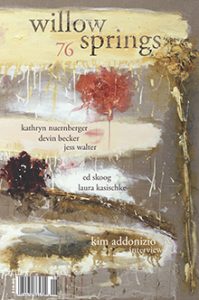
About Carissa Halston
Carissa Halston’s short fiction has appeared in Fourteen Hills, The Massachusetts Review, The Collagist, and elsewhere. She currently runs a small press called Aforementioned Productions, edits a literary journal called apt, and is at work on a novel called Conjoined States and a short story collection called Emergency Exit.
A Profile of the Author
Notes on “Call It a Map”
I had been looking at job listings on Craigslist—which is an art form in itself—and I saw an ad for a sleep study that sought healthy individuals whose participation would aid residents on an international space station. As soon as I saw the details, I knew I would write a story about the study. I went so far as to sign up just so I could have some insight into the process and its related details, but I wasn’t selected, so I added complications to my narrator’s life, complications that enhanced and troubled her decision to take part in the study: most obviously, her disability (which presented me with many hours of research), but more importantly, her relationship with her sister, Tilly.
When I was working on the sisters’ characters, I wanted to hint at the idea that siblings grow up in comparison to each other, and Liz’s and Tilly’s adult relationship feeds off of what one can handle that the other can’t, and vice versa. But in childhood (at least, in Liz’s memories of her childhood), it was a simple case of loving resentment. They can’t bring themselves to ask, Why aren’t you exactly like me?And in their joint inability to ask, there comes generosity and self-condemnation—one sister allows the other so much room in her life that it winds up stifling them both.
Formally, I wanted to push sensory details as far as I could without relying on imagery, which meant I was allowed to choose similes and metaphors that wouldn’t fly in another story. All stories rely on internal logic, but I find the most cohesive narratives are those that use their plot details to inform their diction.
Notes on Reading
Reading informs everything I write. When I read something that remakes me as a reader—the sort of story that divides your life into before and after you read it—then I’m in student mode, trying to figure out how I can learn from the success of that narrative. Fiction writers who I feel are constantly teaching me: Amy Hempel (the structure of her stories is astoundingly tight), David Foster Wallace (his diction is unparalleled, plus he could be funny and sad in a single clause), and Italo Calvino, as translated by William Weaver (every word matters—every single word).
Right now, I’m reading Kathy Page’s Alphabet, Lydia Peelle’s Reasons for and Advantages of Breathing, Porochista Khakpour’s Sons and Other Flammable Objects, and Michelle Tea’s The Chelsea Whistle, all of which contain incredible, helpful lessons. To wit:
I’m in love with Peelle’s sentences. She creates these complex, layered problems out of odd, yet recognizable scenarios, and lures us in via these gorgeous sentences, e.g., she tells us that there might be a wild cat loose in a city, and everyone is obsessing over it: “In the houses, the big cat creeps nightly, making the rounds of dinner tables and dreams.” Compression, concision, and phonetically pleasing, to boot.
Khakpour’s novel is an endurance trial in scope and form. She’s covering a metric ton of ground historically, including the Iranian revolution, the history of Persian royalty, and the interaction between Xerxes, the protagonist, and his father, Darius, which works in a series of reversed expectations, and if that weren’t enough, her sentences are magnificently lengthy: “And so on a train to Istanbul—fleeing, seeking neutrality, anonymity, normalcy, suddenly, both seized with the alarming reality that they were running away, fleeing from their homes, maybe forever—they looked at their young son, humming obliviously in his mother’s lap, and she brought it up with tears in her eyes, and he agreed instantly, that of all the naysayings they had done in their time together, perhaps the one they feared and regretted and hoped hadn’t cursed them the most was the one in the time of their dark courtship, when they had both agreed that if they ever had a child it would be miserable, untalented, ugly, uninspired, a nothing of an offspring, the end they would both deserve: an error even, at best.”
I just started Page’s Alphabet because it’s about a heavily tattooed man in prison, and I’m working on a novel that features an incarcerated populace, and my protagonist (on his way to being heavily tattooed) is threatened with incarceration. Every decision he makes steers him toward or away from entrapment, and I want that threat to feel genuine, so in order to achieve a higher level of believability, I know I need to read as much as I can about prison, including other novels, and Page’s grabbed me because its structure is non-linear (instead of ABC, it’s BAC), and I’m a sucker for time tricks in fiction.
And lastly: Tea. This is the third book of hers I’ve read (the other two: Valencia and The Passionate Mistakes and Intricate Corruption of One Girl in America), and though I bought The Chelsea Whistleyears ago, I’m reading it now because I’m moving home to Boston after almost two years away. Tea’s memoir is about growing up in Chelsea, a town adjacent to Boston, so it’s preparing me for life going forward. That’s my take on reading: with the right book, I can prepare for anything.


